
Captain Blood is a 1935 American black-and-white swashbuckling pirate film from First National Pictures and Warner Bros. Pictures, produced by Harry Joe Brown and Gordon Hollingshead, directed by Michael Curtiz and starring Errol Flynn, Olivia de Havilland, Basil Rathbone, and Ross Alexander.
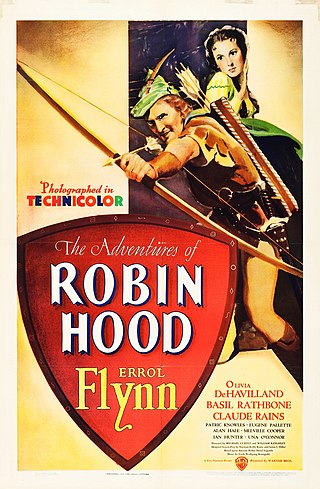
The Adventures of Robin Hood is a 1938 American Technicolor epic swashbuckler film from Warner Bros. Pictures. It was produced by Hal B. Wallis and Henry Blanke, directed by Michael Curtiz and William Keighley, and stars Errol Flynn, Olivia de Havilland, Basil Rathbone, Claude Rains, Patric Knowles, Eugene Pallette, and Alan Hale. The film is particularly noted for its Academy Award-winning score by Erich Wolfgang Korngold.

Errol Leslie Thomson Flynn was an Australian actor who achieved worldwide fame during the Golden Age of Hollywood. He was known for his romantic swashbuckler roles, frequent partnerships with Olivia de Havilland, and reputation for his womanising and hedonistic personal life. His most notable roles include Robin Hood in The Adventures of Robin Hood (1938), which was later named by the American Film Institute as the 18th greatest hero in American film history, the lead role in Captain Blood (1935), Major Geoffrey Vickers in The Charge of the Light Brigade (1936), and the hero in a number of Westerns such as Dodge City (1939), Santa Fe Trail, Virginia City, and San Antonio (1945).

Dame Olivia Mary de Havilland was a British-American actress. The major works of her cinematic career spanned from 1935 to 1988. She appeared in 49 feature films and was one of the leading actresses of her time. At the time of her death in 2020 at age 104, she was the oldest living and earliest surviving Academy Award winner and was widely considered as being the last surviving major star from the Golden Age of Hollywood cinema. Her younger sister was Oscar-winning actress Joan Fontaine.
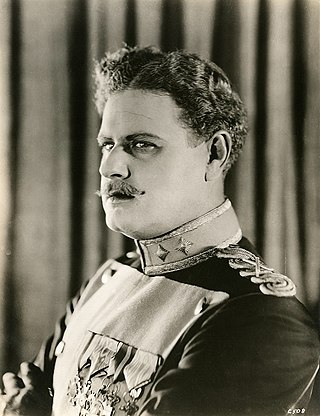
Alan Hale Sr. was an American actor and director. He is best remembered for his many character roles, in particular as a frequent sidekick of Errol Flynn, as well as films supporting Lon Chaney, Wallace Beery, Douglas Fairbanks, James Cagney, Clark Gable, Cary Grant, Humphrey Bogart, and Ronald Reagan. Hale was usually billed as Alan Hale and his career in film lasted 40 years. His son, Alan Hale Jr., also became an actor and remains most famous for playing "the Skipper" on the television series Gilligan's Island.

The Private Lives of Elizabeth and Essex, for a time also entitled Elizabeth the Queen, is a 1939 American historical romantic drama film directed by Michael Curtiz and starring Bette Davis, Errol Flynn, and Olivia de Havilland. Based on the play Elizabeth the Queen by Maxwell Anderson—which had a successful run on Broadway with Lynn Fontanne and Alfred Lunt in the lead roles—the film fictionalizes the historical relationship between Queen Elizabeth I and Robert Devereux, 2nd Earl of Essex. The screenplay was written by Norman Reilly Raine and Aeneas MacKenzie.
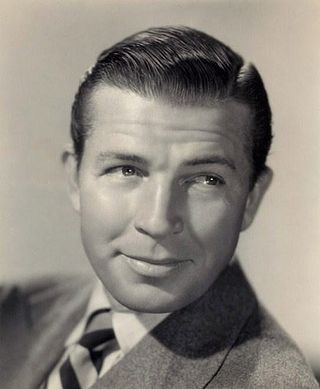
Bruce Cabot was an American film actor, best remembered as Jack Driscoll in King Kong (1933) and for his roles in films such as The Last of the Mohicans (1936), Fritz Lang's Fury (1936), and the Western Dodge City (1939). He was also known as one of "Wayne's Regulars", appearing in a number of John Wayne films beginning with Angel and the Badman (1947), and concluding with Big Jake (1971).

Virginia City is a 1940 American Western film directed by Michael Curtiz and starring Errol Flynn, Miriam Hopkins, Randolph Scott, and a mustachioed Humphrey Bogart in the role of the real-life outlaw John Murrell. Based on a screenplay by Robert Buckner, the film is about a Union officer who escapes from a Confederate prison and is sent to Virginia City from where his former prison commander is planning to send five million dollars in gold to Virginia to save the Confederacy. The film premiered in its namesake, Virginia City, Nevada. The film was shot in black and white (sepiatone).

Santa Fe Trail is a 1940 American Western film directed by Michael Curtiz and starring Errol Flynn as J. E. B. "Jeb" Stuart, Olivia de Havilland, Raymond Massey as John Brown, Ronald Reagan as George Armstrong Custer and Alan Hale. Written by Robert Buckner, the film is critical of the abolitionist John Brown and his controversial campaign against slavery before the American Civil War. In a subplot, Jeb Stuart and George Armstrong Custer—who are depicted as friends from the same West Point graduating class—compete for the hand of Kit Carson Holliday.
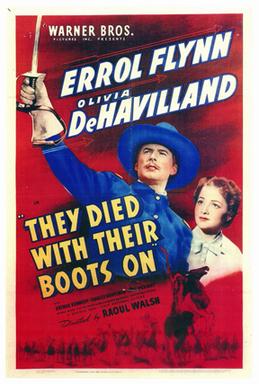
They Died with Their Boots On is a 1941 American Biographical western film from Warner Bros. Pictures, produced by Hal B. Wallis and Robert Fellows, directed by Raoul Walsh, that stars Errol Flynn and Olivia de Havilland.

The Charge of the Light Brigade is a 1936 American historical adventure film from Warner Bros., starring Errol Flynn and Olivia de Havilland. It was directed by Michael Curtiz and produced by Samuel Bischoff, with Hal B. Wallis as the executive producer. The film's screenplay is by Michael Jacoby and Rowland Leigh, from a story by Michael Jacoby, and based on the 1854 poem "The Charge of the Light Brigade" by Alfred, Lord Tennyson. The music score was composed by Max Steiner, his first for Warner Bros., and the cinematography was by Sol Polito. Scenes were shot at the following California locations: Lone Pine, Sherwood Lake, Lasky Mesa, Chatsworth, and Sonora. The Sierra Nevada mountains were used for the Khyber Pass scenes.

Raymond William Hatton was an American film actor who appeared in almost 500 motion pictures.

Four's a Crowd is a 1938 American romantic comedy film directed by Michael Curtiz, starring Errol Flynn, Olivia de Havilland, Rosalind Russell and Patric Knowles. The picture was written by Casey Robinson and Sig Herzig from a story by Wallace Sullivan. This was the fourth of nine films in which Errol Flynn and Olivia de Havilland appeared.

William Paul Lundigan was an American film actor. His more than 125 films include Dodge City (1939), The Fighting 69th (1940), The Sea Hawk (1940), Santa Fe Trail (1940), Dishonored Lady (1947), Pinky (1949), Love Nest (1951) with Marilyn Monroe, The House on Telegraph Hill (1951), I'd Climb the Highest Mountain (1951) and Inferno (1953).
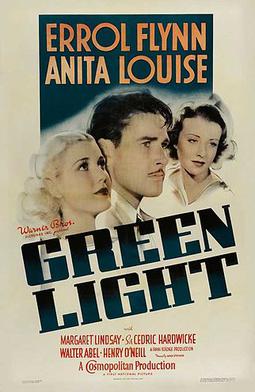
Green Light is a 1937 American drama film directed by Frank Borzage and starring Errol Flynn, Anita Louise and Margaret Lindsay. The film is adapted from a novel written by Lloyd C. Douglas. The novel is closely related to Douglas' previous book, Magnificent Obsession, which was also adapted as a movie. It was Flynn's first starring role in a studio film that was not an action movie.

George Melville Cooper was an English actor. His many notable screen roles include the High Sheriff of Nottingham in The Adventures of Robin Hood (1938), Mr. Collins in Pride and Prejudice (1940) and the wedding-rehearsal supervisor Mr. Tringle in Father of the Bride (1950).

Footsteps in the Dark is a light-hearted 1941 mystery film, starring Errol Flynn as an amateur detective investigating a murder.

The Kansan is a 1943 Western film directed by George Archainbaud. The film is also known as Wagon Wheels in the United Kingdom.
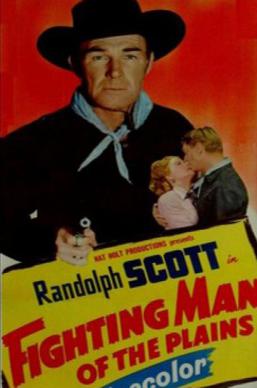
Fighting Man of the Plains is a 1949 American Western film produced by Nat Holt and directed by Edwin L. Marin. It starred Randolph Scott, Bill Williams, Victor Jory, and Jane Nigh. The supporting cast included Joan Taylor, Barry Kelley, Douglas Kennedy, Paul Fix, Rhys Williams, James Millican and, in his first credited role, Dale Robertson as Jesse James.

Montana is a 1950 American Western film directed by Ray Enright and starring Errol Flynn. It was only the second time Flynn played an Australian on screen, the first time being Desperate Journey (1942).



















